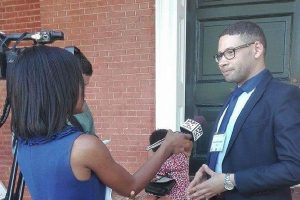-
What We Do
- WHERE WE WORK
-
About Us
 Welcome Message from Carol Jenkins
Welcome Message from Carol JenkinsFor more than 90 years, World Learning has equipped individuals and institutions to address the world’s most pressing problems. We believe that, working together with our partners, we can change this world for the better.
On my travels, I’ve had the opportunity to meet with many of those who have joined us in this mission. In Baghdad, we’ve trained more than 2,300 Iraqi youth who are already giving back at home. In London, our partners in the TAAP Initiative strongly believe that we are all responsible to practice inclusion. And in Vermont, our Experiment in International Living and School for International Training participants prove every day that they have the tools and the determination to change the world.
Please join us in our pursuit of a more peaceful and just world.
- Get Involved
Media Center > Story
Investing in Small Enterprises Is Key to Algeria’s Future
July 12, 2017
Abderrahmane Harbi wants to bring innovation to Algeria.
The business consultant from Blida, Algeria, says the country’s 10-year civil war is largely responsible for the high rate of unemployment — which hovers over 10% — and economic stagnation.
The best way to move forward, he says, is by creating new and long lasting enterprises, which he says will help diversify Algeria’s economy.
“It’s very exciting to be able to create something and help people to create something …and see the result of what you’re doing instantly,” he says.
 Harbi recently participated in the Leaders for Democracy Fellowship (LDF), a program providing emerging and mid-career civic leaders from the Middle East and North Africa (MENA) an opportunity to develop leadership skills in the U.S. Funded by the U.S. Department of State and implemented by the non-profit World Learning, LDF also offers fellows the opportunity to meet other young leaders from the region, exchange ideas and share experiences. He says that after speaking with fellows about the influx of Syrian refugees from Jordan, he was inspired to help Malian refugees in Algeria.
Harbi recently participated in the Leaders for Democracy Fellowship (LDF), a program providing emerging and mid-career civic leaders from the Middle East and North Africa (MENA) an opportunity to develop leadership skills in the U.S. Funded by the U.S. Department of State and implemented by the non-profit World Learning, LDF also offers fellows the opportunity to meet other young leaders from the region, exchange ideas and share experiences. He says that after speaking with fellows about the influx of Syrian refugees from Jordan, he was inspired to help Malian refugees in Algeria.
Harbi says in comparison to other MENA countries, Algeria is lagging in enterprising business.
“When Algeria was a colony it was one of the greatest exporters for agricultural product,” he says. “Now in terms of innovation, Algeria is not a leader. There are so many countries that are advanced in technology and innovation that are so far ahead of us,” adds Harbi.
During the program, Harbi interned at the Center for International Private Enterprise (CIPE), which seeks to strengthen democracies through private enterprise and market-oriented reforms.
“Even before I came to the U.S. I wanted to work for CIPE because I share the same values as them,” he says.
Now back in Algeria, Harbi is planning to work closely with a company that developed a bracelet used to track and locate kidnap victims.
“In Algeria people don’t know that they have the power to change things,” he says. “Not unless they try.”





